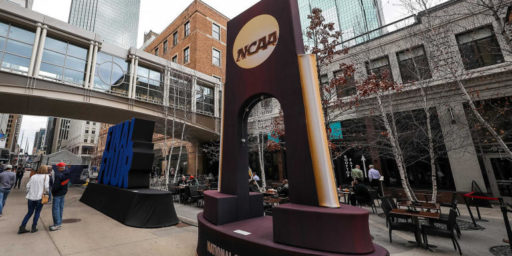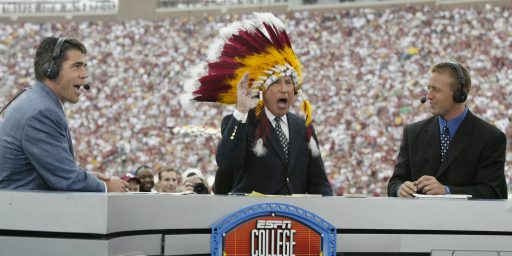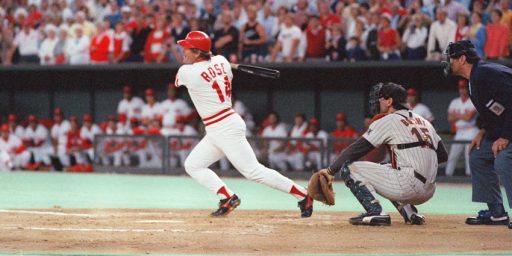NCAA Live Blog Ban II
Troy Johnson of the Columbus Ledger-Enquirer has more to say about the NCAA’s tossing a Louisville Courier-Journal sports writer out of a baseball playoff game for live-blogging it. As I surmised yesterday, the NCAA’s motivation was to protect the interests of those to whom it sold broadcast rights.
Forget about First Amendment rights, such as freedom of the press. The NCAA appears more concerned with protecting broadcast rights, the ATM from which it pulls so much cash.
You might wonder why this matters to you.
It should if you’re a sports consumer.
For years, TV networks have paid big money for the live broadcast rights to events such as the NCAA Final Four, the World Series and the Super Bowl. It’s standard practice and there’s certainly nothing wrong with that.
In this instance, however, the NCAA seems to have overstepped its boundaries by trying to control an evolving medium that has become an extension of the printed newspaper and the 6 o’clock newscast. The Geico cavemen apparently possess a better understanding of current technology than the NCAA, which may actually be an acronym for Neanderthals Controlling All Access.
[…]
The outcome of this dust-up could impact what you’re able to read about your favorite college football or basketball team in the near future.
The NCAA argues that blogs written during games conflict with live online coverage rights purchased by ESPN and CBS along with the TV contract for the college baseball tournament. Perhaps that would be true if a blogger supplied streaming video or live audio during a game.
In Bennett’s case, however, he merely provided comprehensive coverage for Louisville fans following the biggest baseball game in school history. The NCAA should be on board with that since the Cardinals were lucky to draw more than 500 fans for regular season games. It should be thankful somebody thought a college baseball tournament important enough to merit a blog since other minor NCAA sports like gymnastics, golf, tennis and soccer receive minimal attention.
As I noted yesterday, I think the NCAA is being short-sighted about this. Johnson is absolutely right that the more resources fans have for keeping up with their favorite sport, the better for all concerned.
Still, it’s absolutely the NCAA’s right to make that judgment. There is no First Amendment issue at stake here. None.
Oddly enough, there’s nothing the NCAA could have done to prevent Bennett or anyone else from posting their thoughts from the left-field bleachers or from watching the ESPN telecast in a pub around the corner and blogging about it.
Practically speaking, he’s right. I live-blogged the NFL Draft, for example, as I have the past two seasons, at OTB Sports, from the comfort of home. Whether the “All Rights Reserved” notification technically gives the NCAA or other entities a right to sue bloggers for unauthorized use of their telecast may be an open question, although I can’t imagine it would stand up in court.
But, again, the NCAA has every right to control what happens in its venue. Surely, it could stop a Vlogger from doing a video blog of the game? Or an audio stream? If so, why not running text commentaries in real time?






Yes, but only to a point…
Because, as I noted in the previous thread,Bennett isn’t just some random guy typing on a blog – he’s a reporter. With actual, bona fide, NCAA-approved press credentials.
Now, having never been a reporter myself, I know nothing from press passes. But once the NCAA credits him as a member of the press, formally authorizing him to report the event, can they then put pre-conditions on the way he reports that info?
I’m not sure why that matters. I’ve got every First Amendment right that a guy working for a small paper does. Speech and press are complementary rights, protecting both the spoken and written forms of expression. Freedom of the press is not a granting of rights to a trade guild — for which there were no barriers to entry other than being able to afford a press in 1791 — but the right to express views in writing.
Sure. Again, he couldn’t bring in a satellite set and broadcast it via his paper’s website, contravening ESPN (or whoever’s) licensed privilege. A press pass is a boon from the league to the papers; they can certainly set limits.
Indeed, they sell fans tickets to attend the game and still impose all manner of restrictions on how the fan can watch the game. And how much he can sell the ticket for, for that matter.
The issue is probably more CBS complaining than ESPN since CBS owns CSTV which has been providing one of those live Gametracker things for all of the tournament. The ability to be the exclusive place to get in-game updates online is ESPN.com/CSTV and the NCAA site is delayed some from those even (I think that’s a technology issue rather than an agreement.)
I was so psyched when Bennett decided to live blog the game–it is so much more fun having to hit ‘refresh” a bunch of times and get his written commentary two minutes after the action rather than the drag of having to watch the game on TV.
It seems clear that blogging is a much better medium for consuming a sports game than television. Thank god for the NCAA to stop this thing in its infancy.